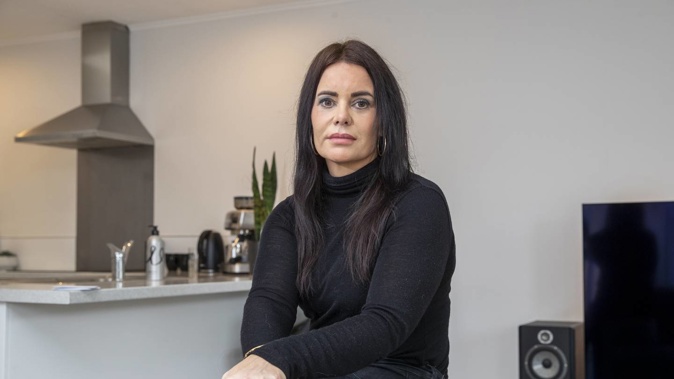
WARNING: This article references suicidal thoughts
The physical wounds healed years ago, but psychologically, she says they’re still fresh.
Katrina Connolly’s voice shakes when recounting what she’s been through over the past five years.
The Health and Disability Commissioner (HDC) found a doctor failed to provide services to Connolly with reasonable care and skill when he injured her while performing surgery after not reading her notes. Connolly believes he got off lightly because he was not named in the ruling, and she has been left struggling to cover the cost.
“There were times where I just wanted to die, I’ve thought about it often. And now I suffer.”
The Wellington woman, now 47, had a long history of pelvic pain, prolonged bleeding and uterine fibroids when she arrived at the lower North Island medical facility to have her uterus, cervix, ovaries and fallopian tubes removed on July 17, 2019.
The surgeon had operated on her before and was aware she had two ureters (the tube which carries urine from the kidney to the bladder).
While the doctor said in the HDC decision he did review her ultrasound images, the commissioner said he did not remember she had a second ureter and did not follow his usual practice of reading clinical notes before starting the surgery and as a result, the second ureter was injured.
“He had had frequent contact with [Connolly] and felt fully updated on her condition at that time,” the HDC said. “He said that there had been a ‘plethora of ongoing correspondence’.”
For months after the surgery, Connolly suffered and felt no one believed she was still in severe pain.
Katrina Connolly at her home in Johnsonville, Wellington. Photo / Mark Mitchell
Speaking through tears to the Herald on Sunday, she said she was diagnosed with post-traumatic stress disorder, which she believes stems from not being listened to.
“They were putting it down to the hysterectomy, it got to the point where I had an emergency scan to see what was going on and then they found that he had damaged my ureter.”
In the ruling, deputy commissioner Deborah James found the surgeon had breached Right 4 (1) of the Code of Health and Disability Services Consumers’ Rights.
James said she considered it more likely than not that the injury to Connolly’s ureter was a result of the doctor’s failure to review the documentation to ensure that he had all the relevant information about her prior to performing the surgery.
“Dr B [a pseudonym given to him by the commission] also acknowledged that it is possible that the injury could have been prevented if he had reviewed the documentation,” she wrote.
Although she acknowledged the doctor had “excellent communication” with Connolly in the lead-up to the surgery, she said his failure to familiarise himself with the notes immediately before it resulted in a lack of awareness of her two ureters and constituted a moderate departure from the accepted standard of care.
James recommended the doctor provide a formal written apology to Connolly and give evidence over a six-month period showing notes are reviewed prior to surgeries being performed.
A lawyer representing the man told the Herald on Sunday it would be “inappropriate and unprofessional” for him to comment, but he remained “devastated” by the error that occurred and the impact it had on Connolly.
He said it was regrettable that Connolly was frustrated with the findings, but her concerns were subject to a comprehensive formal investigation.
“[The doctor] fully engaged with the HDC investigation process, accepted the findings, and agreed to the HDC’s recommendations. Likewise, the matter was considered by the Medical Council of New Zealand.”
A spokesperson for the region’s district health board (DHB) said it accepted the findings.
They said the report found it was responsible for providing appropriate services and had not breached the code.
“Patient safety and care quality remain paramount.”
While the case was closed last September, Connolly said she will feel the impact of Dr B’s actions for the rest of her life and went into debt because of her medical costs, and her legal bill for the private lawyer she hired for the case.
A driving factor in her wanting to tell her story now was another case recently published in the Herald, which detailed how a woman was left with a permanent colostomy bag after a specialist removed a 30cm cyst from her left ovary without consent and perforated her bowel in the process.
“I don’t even know how he sleeps at night, like I was offered to have a meeting with him in the DHB and I just didn’t want to because I don’t want to see his face.”
She said that in her opinion, “there’s nothing that he’s offered to help or anything like that. He sent me a two-line apology that he wrote that the HDC asked him to. It’s like he doesn’t care. It’s insulting. Other women that go for surgeries should know what he’s done”.
Connolly underwent a lengthy procedure to correct the damage, leaving her with a “huge scar”.
“From there it took me a couple of years to heal from both surgeries. It just took away my life.”
/cloudfront-ap-southeast-2.images.arcpublishing.com/nzme/EPOG7EWT2ZHZHJPN2SNZQSEP6M.jpg)
Katrina Connolly had a nephrostomy tube inserted while she was hospitalised.
Still, the healing surgery didn’t stop the pain, Connolly said.
“The mental stuff is probably the worst, the anxiety and the panic that I get on a daily basis.
“Every little thing in my body I freak out. So, it ruined me financially, it’s affected my loved ones, it’s broken my loved ones’ hearts. They can’t do anything and it’s just so wrong. Our whole system is so wrong.”
She said this also caused her to fear the Covid-19 vaccine, leading to a relationship breakdown with her workplace, as she felt unable to trust the medical system.
Filing the complaint against Dr B with the commission cost her financially in legal fees. She even launched a Givealittle page recently to help with bills.
She said the trauma has permeated her relationships with others, who she says want to fix what happened to her but can’t.
“I feel like my brain has been damaged from this, just a constant worry and fear of something wrong with me. It’s affected every part of my life.
“I can’t describe it. It’s like just talking about it, it’s like that adrenaline through your body where you feel like you’re reliving it.”
Katie Harris is an Auckland-based journalist who covers social issues including sexual assault, workplace misconduct, crime and justice. She joined the Herald in 2020.
SUICIDE AND DEPRESSION
Where to get help:
• Lifeline: Call 0800 543 354 or text 4357 (HELP) (available 24/7)
• Suicide Crisis Helpline: Call 0508 828 865 (0508 TAUTOKO) (available 24/7)
• Youth services: (06) 3555 906
• Youthline: Call 0800 376 633 or text 234
• What's Up: Call 0800 942 8787 (11am to 11pm) or webchat (11am to 10.30pm)
• Depression helpline: Call 0800 111 757 or text 4202 (available 24/7)
• Helpline: Need to talk? Call or text 1737
If it is an emergency and you feel like you or someone else is at risk, call 111
Take your Radio, Podcasts and Music with you

/cloudfront-ap-southeast-2.images.arcpublishing.com/nzme/2XJ52XYTWJGW7ESKDTEETGFSTM.JPG)








